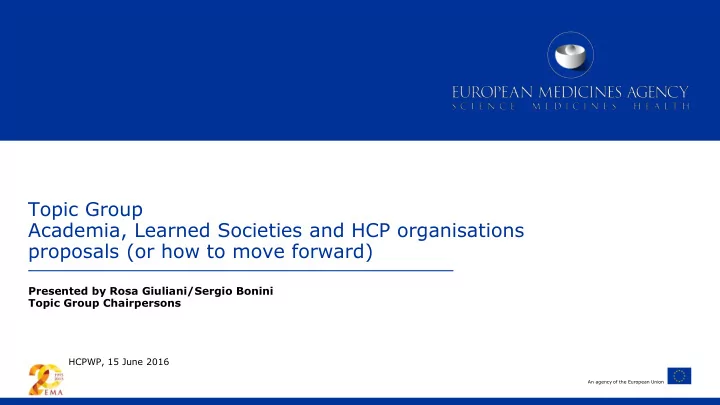

Topic Group Academia, Learned Societies and HCP organi s ations proposals (or how to move forward) Presented by Rosa Giuliani/Sergio Bonini Topic Group Chairpersons HCPWP, 15 June 2016 An agency of the European Union
General objectives of the Topic Group Reflect on the need to review the EMA framework of interactions with HCPs Support the development of the EMA framework for collaboration with Academia Identify current practice with involvement in regulatory activities Discuss areas for improvement and foreseeable changes 1
Topic Group Members Chairpersons : Sergio Bonini (EMA), Rosa Giuliani (ESMO) • Angeles Alonso Garcia (ESC) • Lorenzo Dagna (EFIM) • Jamie Wilkinson (PGEU) • Olivier Clement (ESR) • Gonzalo Calvo (EACPT) • Roberto Frontini (EAHP) • Michel Delvaux (UEG) • Karin Plass (EAU) • Riccardo Riccardi (PDCO) • Marianne de Visser (EAN) 2
Activity progress since June 4,2015 A Kick-off teleconference was held on June 29 to define actions, responsibilities, deadlines • and milestones Nomination of chairpersons : Sergio Bonini (EMA) and Rosa Giuliani (ESMO) • Interaction through TCs and mini-meeting during HCPWP meetings • Preparation of internal (topic group) survey (Monica Ensini) • Preparation of a questionnaire for Academia, Learned Societies and HCP organizations • (Monica Ensini) 3
Key areas of the internal survey Does the current EMA framework of interaction with HCPs need to be reviewed? http://www.ema.europa.eu/docs/en_GB/document_library/Other/2011/12/WC500119625.pdf Which initiatives can be suggested to develop closer relationship with Academia? Areas deserving special consideration (from a general point of view and more specifically to each organization)
Summary of the comments received Review of the HCP framework document The 2011 Framework document should be up-dated to adapt • to a more relevant role of HCPs in drug development and monitoring HCPs should significantly contribute to the drafting of an • updated version 5
Which initiatives to enhance relationships with Academia ? • More active involvement in regulatory policy initiatives • Increased representation in EMA Committees • Early involvement in the authorization process of medicines • Joint workshops on specialized topics • Cross-learning programs and reciprocal participation in scientific events • Involvement in drafting of documents and guidelines 6
SWOT Analysis of the current situation Strenghts Weakness Existence of the framework Priorisation Short deadlines Bilateral willingness and commitment for HCP umbrella of different societies: a closer collaboration Uncertainty on deliverables Transparency & intensive dialogue Organisation & support Opportunities Threats Inefficiency in finding common denominators Each partner can bring an unique Theoretical discussions, deviation from daily complementary contribution practice Feedback on relevant documents / Economical support Prioritization for bodies with a very busy communications agenda 7
Conclusions (survey) and future activities of the Topic Group The HCP framework document could be reviewed with the contribution of HCP Relationships with HCP/Academia and EMA should be enhanced: -A more active involvement of HCP/Academia in EMA activities -Enhancement of educational programs and reciprocal participation in scientific events -Collaboration in research projects Future activities -Discussion within the Topic Group of issues emerged -Launch and analysis of the Academia/HCP Survey 8
1. Active involvement 9
EFFICACY EFFECTIVENESS EFFICIENCY Does it work Does it work Does it contribute to more in clinical TRIALS? in clinical PRACTICE? efficient use of resources? HCP organizations/Academia Real-world data B/R HTA assessment (registries, post-A S&E studies, EMA National HTAN observational trials…) 10
2. Education & Research 11
EDUCATION RESEARCH COMMUNICATION -Workshops on specific topics of Calls for topics of interest Improved in time, still suboptimal reciprocal and pragmatical interest Eg: -how to use Real world data (confusion or lack of knowledge on (to be discussed by HCPWP?) -biomarkers EMA activities) -Educational program in Regulatory -how to structure a EU collaboraive Research on communication : how Science (Uni/masterclass, et cet…) Research do HCPs/Academia organization -Facilitating “ permeation ” -Interaction with EUnetHTA/HTAN receive information? HCP organizations/Academia Publication Regular updates on websites Intersection with other topic groups In the societies Journal (both EMA and Academia) and (social media) (eg “ contents ” from this journals workshop! ) 12
Communication & Dissemination of information 13
Awareness of regulatory activities is suboptimal on both side of the ocean… Kesselheim et al 14
EMA-ACADEMIA workshop Workshops e.g. Biomarkers 2005, 2006; Pharmacogenomics 2008; Personalised Medicine 2012; Immunotherapies 2016 Rare cancers Shift in biology: precise medicine a lot of smaller biologic entities: How do we collect data to speed up innnovation? Workshop on single-arm CTs EMA, 30 th June 2016, 15
Promotion of platforms/forums for interaction and collaboration 16
Thank you for your attention Further information HCPsecretariat@ema.europa.eu European Medicines Agency 30 Churchill Place • Canary Wharf • London E14 5EU • United Kingdom Telephone +44 (0)20 3660 6000 Facsimile +44 (0)20 3660 5555 Send a question via our website www.ema.europa.eu/contact Follow us on @EMA_News
>>>>50 Shades of grey…. CARDIO- HTA Regulatory CANCER VASCULAR & approval DISEASE Reimbursement HCPs/Academia organizations may contribute to clear grey areas (sometimes we create them..) Speeding Clinically Robust Innovative Regulatory Meaningful evidence drugs approval benefit development
Recommend
More recommend